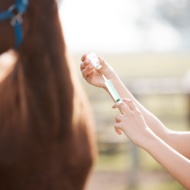BEVA recognises equine vets in post-congress awards
Dr Victoria South wins the HBLB Award for her work on fatal laminitis.
The British Equine Veterinary Association (BEVA) has recognised the work of two veterinary surgeons, following its 2023 Congress.
Dr Julia Shrubb and Dr Victoria South were awarded their accolades for the clinical research they each presented at BEVA Congress this year.
The Sam Hignett Award was won by Dr Shrubb for her presentation of her research, ‘Understanding UK parasite control practices: A horse owner survey’. The project, the abstract of which is published in the Equine Veterinary Journal (EVJ), aims to investigate how horse owners control intestinal parasites in their horses in an effort to tackle anthelmintic resistance.
She wins free registration to this year’s AAEP Annual Convention in San Diego.
The Sam Hignett Award is presented annually, and is open to equine practice clinical research presented at BEVA Congress. It is named for Sam Hignett, former president of BEVA and the Royal College of Veterinary Surgeons, as well as the official veterinary surgeon for national and international horse events.
The HBLB Award goes to Dr Victoria South, a specialist in equine internal medicine at the University of Cambridge. Dr South presented research exploring the risk of fatal laminitis in horses hospitalised for a phallectomy compared to a laparatomy, the abstract of which is published in the EVJ.
The lead author of the paper, Dr Rachel Tucker, was unable to attend congress, so Dr South presented the research in her absence. Dr South was awarded free registration to BEVA Congress 2024, which can be transferred to a co-author if desired.
The HBLB Award, which replaces the Voorjaarsdagen and BEVA Award, is open to any clinical research abstract prevented at BEVA Congress.
This year’s winners were selected through continuous assessment during abstract submission and live presentation, using new scoring guidelines.
For the first time a clinical research sub-committee, chaired by Dr James Crabtree, was formed of members of the congress committee and independent expert volunteers. The committee reviewed and developed new scoring guidelines to select the winners.
Submissions were subject to blind peer review, and scored by at least two independent reviewers. Those which met EVJ criteria was reviewed, and the most meritorious and relevant were selected to be presented live at congress.
The highest scoring abstracts were judged live at BEVA Congress under either the HBLB or Sam Hignett award.
Dr Crabtree said: “These two award recipients have been through a rigorous process of review and have presented to an audience of peers in a stimulating and effective way and we celebrate this sharing of knowledge through these awards. Well done to you both!”
Abstract submissions for BEVA Congress 2024 open from 18 January 2024- 8 February 2024.
Image © Shutterstock



 Zoetis UK has apologised for a supply shortage of Equip Artervac, caused by a manufacturing issue.
Zoetis UK has apologised for a supply shortage of Equip Artervac, caused by a manufacturing issue.